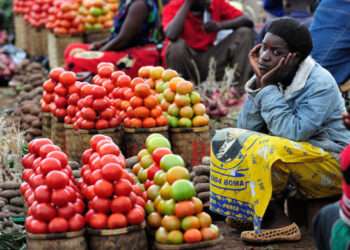The Ghana Incentive-Based Risk-Sharing System for Agricultural Lending (GIRSAL) has revealed an ambitious initiative that could earn the country over $30 million in revenue from chilli pepper exports within the next three years.
This bold projection stems from a new project aimed at enhancing the capacity of Ghanaian farmers to meet international standards and tap into the growing global demand for high-quality chilli peppers.
At the heart of this initiative is a farmer training programme designed to cover 30 hectares of chilli pepper cultivation specifically for export. Farmers involved in the programme will be equipped with the necessary knowledge and skills to meet the strict quality requirements of the international market.
“These farmers who are taking part in this project in the first place will have their capacities built,” stated Samuel Yeboah, Chief Operating Officer of GIRSAL, during a media briefing. “They will learn how to produce chilies under safe conditions more efficiently to be able to develop and scale up their production to the highest level.”

The training will focus on best agricultural practices, post-harvest handling, and compliance with international sanitary and phytosanitary measures. These steps are crucial to ensure that Ghanaian chilli peppers remain competitive on the global market and are accepted by high-paying markets in Europe, Asia, and beyond.
First Phase to Generate $3 Million
GIRSAL’s initiative is structured in phases, with the first phase expected to bring in $3 million in export revenue. This initial success is anticipated to pave the way for a full-scale rollout, eventually generating over $30 million within three years.
“This project, the first phase alone will be bringing in about $3 million into the country,” Yeboah disclosed. “We hope that in the next three years, we should be getting over $20-30 million from chili exports alone into the country.”
This incremental approach ensures that lessons learned in the early stages can be applied to improve productivity and efficiency in subsequent phases. It also serves as a pilot to demonstrate the viability of chilli export as a sustainable source of income for smallholder farmers and the national economy.
Supporting Government’s Export Agenda
The chilli export initiative is aligned with the government’s broader goal of accelerating non-traditional exports as a means of diversifying Ghana’s economy and improving foreign exchange earnings. As traditional exports like cocoa and gold face market volatility, the government is pushing to broaden the export base through targeted interventions in agriculture and agro-processing.
“This aligns with the government’s accelerated export development agenda. We are going to work in partnership with the government agencies to ensure that we achieve this aim.”
Samuel Yeboah
By supporting farmers with training, infrastructure, and access to finance, GIRSAL plays a critical role in de-risking agricultural lending and encouraging investment in high-potential crops like chilli peppers.
Ghana’s favorable agro-climatic conditions make it ideal for chilli production, yet the country has not fully capitalized on this opportunity due to challenges such as lack of training, poor access to credit, and low compliance with export standards. GIRSAL’s project seeks to bridge these gaps and unlock the full potential of Ghana’s agricultural sector.
If successful, the project could serve as a blueprint for similar export-driven agricultural initiatives in other crops, contributing to rural development, job creation, and food security.
Through strategic partnerships, farmer training, and a phased approach to implementation, GIRSAL’s chilli export project offers a clear pathway to achieving $30 million in revenue over the next three years.
As Yeboah noted, “We hope that in the next three years, we should be getting over $20-30 million from chili exports alone into the country.” This vision, if realized, will not only boost the country’s economy but also empower local farmers to participate meaningfully in the global agricultural value chain.
READ ALSO: GSE Market Capitalization Hits GHS 143.4 Billion Amid Rising Indices

















